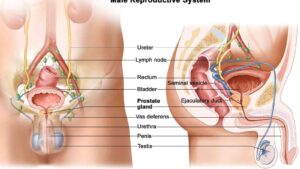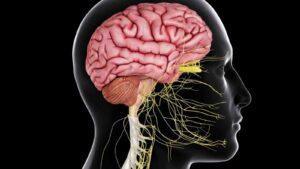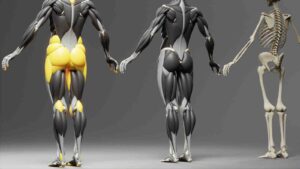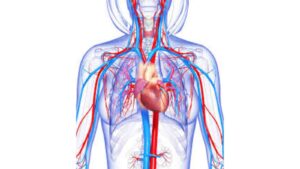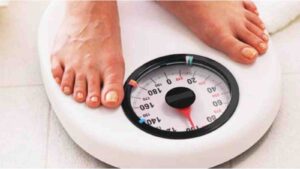The effects of testosterone on the body
Summary
The effects of testosterone on the body. Testosterone is a vital male hormone that is responsible for the development and maintenance of male attributes. Women also have testosterone, but in much smaller amounts. A male begins to produce testosterone as […]

The effects of testosterone on the body. Testosterone is a vital male hormone that is responsible for the development and maintenance of male attributes. Women also have testosterone, but in much smaller amounts.
A male begins to produce testosterone as early as seven weeks after conception. Testosterone levels rise during puberty, peak during the late teen years, and then level off. After age 30 or so, it’s normal for a man’s testosterone levels to decrease slightly every year.
Most men have more than enough testosterone. But it’s possible for the body to produce too little testosterone. This leads to a condition called hypogonadism. This can be treated with hormonal therapy, which requires a doctor’s prescription and careful monitoring. Men with normal testosterone levels should not consider testosterone therapy.
Testosterone levels affect everything in men, from the reproductive system and sexuality to muscle mass and bone density. It also plays a role in certain behaviors.
Videos: The effects of testosterone on the body
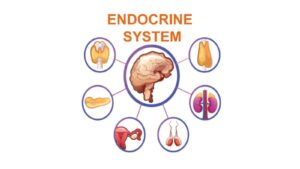 ©javatpoint.com
©javatpoint.com
Endocrine System:
The body’s endocrine system consists of glands that manufacture hormones. The hypothalamus, located in the brain, tells the pituitary gland how much testosterone the body needs. The pituitary gland then sends the message to the testicles. Most testosterone is produced in the testicles, but small amounts come from the adrenal glands, which are located just above the kidneys. In women, the adrenal glands and ovaries produce small amounts of testosterone.
Before a boy is even born, testosterone is working to form male genitals. During puberty, testosterone is responsible for the development of male attributes like a deeper voice, beard, and body hair. It also promotes muscle mass and sex drive. Testosterone production surges during adolescence and peaks in the late teens or early 20s. After age 30, it’s natural for testosterone levels to drop by about one percent each year.
Reproductive System:
About seven weeks after conception, testosterone begins helping form male genitals. At puberty, as testosterone production surges, the testicles and penis grow. The testicles produce a steady stream of testosterone and make a fresh supply of sperm every day.
Men who have low levels of testosterone may experience erectile dysfunction. Long-term testosterone therapy can cause a decrease in sperm production. Testosterone therapy may also cause an enlarged prostate and smaller, softer testicles. Men who have prostate or breast cancer should not consider testosterone replacement therapy.
Sexuality:
During puberty, rising levels of testosterone encourage the growth of the testicles, penis, and pubic hair. The voice begins to deepen, and muscles and body hair grow. Along with these changes comes growing sexual desire.
There’s a bit of truth to the “use it or lose it” theory. A man with low levels of testosterone may lose his desire for sex. Sexual stimulation and sexual activity cause testosterone levels to rise. Testosterone levels can drop during a longperiod of sexual inactivity.
Needless to say, taking drugs should be a last resort. Fortunately, there’s a lot you can do to increase your body’s natural production of testosterone while also making yourself healthier overall.
Central Nervous System:
The body has a system for controlling testosterone and sending messages through hormones and chemicals that are released into the bloodstream. In the brain, the hypothalamus tells the pituitary gland how much testosterone is needed, and the pituitary relays that information to the testicles.
Testosterone plays a role in certain behaviors, including aggression and dominance. It also helps to spark competitiveness and boost self-esteem. Just as sexual activity can affect testosterone levels, taking part in competitive activities can cause a man’s testosterone levels to rise or fall. Low testosterone may result in a loss of confidence and a lack of motivation. It can also lower a man’s ability to concentrate or cause feelings of sadness. Low testosterone can cause sleep disturbances and a lack of energy.
It’s important to note, however, that testosterone is only one factor that influences personality traits. Other biological and environmental factors are also involved.
Skin and hair:
As a man transitions from childhood to adulthood, testosterone spurs the growth of hair on the face, in the armpits, and around the genitals. Hair may also grow on the arms, legs, and chest.
A man with shrinking levels of testosterone may actually lose some body hair. Testosterone replacement therapy comes with a few potential side effects, including acne and breast enlargement. Testosterone patches may cause minor skin irritation. Topical gels may be easier to use, but great care must be taken to avoid transferring testosterone to someone else through skin-to-skin contact.
Videos: The effects of testosterone on the body
Muscle, Fat, and Bone:
Testosterone is one of many factors involved in the development of muscle bulk and strength. Testosterone increases neurotransmitters, which encourage tissue growth. It also interacts with nuclear receptors in DNA, which causes protein synthesis. Testosterone increases levels of growth hormone. That makes exercise more likely to build muscle.
Testosterone increases bone density and tells the bone marrow to manufacture red blood cells. Men with very low levels of testosterone are more likely to suffer from bone fractures and breaks.
Testosterone also plays a role in fat metabolism, helping men to burn fat more efficiently. Dropping levels of testosterone can cause an increase in body fat. Testosterone therapy can be administered by a doctor via intramuscular injections.
Circulatory System:
Testosterone travels around the body in the bloodstream. The only way to know your testosterone level for sure is to have it measured. This usually requires a blood test.
Testosterone spurs the bone marrow to produce red blood cells. And studies suggest that testosterone may have a positive effect on the heart. But some studies investigating testosterone’s effect on cholesterol, blood pressure, and clot-busting ability have had mixed results.
When it comes to testosterone therapy and the heart, recent studies have conflicting results and are ongoing. Testosterone therapy delivered by intramuscular injection may cause blood cell counts to rise. Other side effects of testosterone replacement therapy include fluid retention, increased red cell count, and cholesterol changes.
Maintain a healthy body weight:
As you’ll see throughout this article, there are a lot of things that impact your hormonal system, and thus there are many things you can do to raise your testosterone. However, none of them are as important as simply not being overweight.
Body fat levels have a strong and consistent negative correlation with serum testosterone. In weight loss studies where testosterone was measured, there is a nearly linear association between the amount of weight loss and the increase in testosterone experienced by subjects. People with more testosterone also, unsurprisingly, have more muscle mass.
Part of the reason for this is that fatty tissue produces aromatase, an enzyme that converts androgens—iincluding testosterone—iinto estrogens. Estrogen, in turn, reduces testosterone production via negative feedback in the hypothalamus, so excess body fat tends to cause both high estrogen and low testosterone. The testosterone/estrogen ratio is a prime indicator of sexual health; its decline in obese men is perhaps the most significant mechanism underlying the link between obesity and poor sexual health in men.
Your number one priority should thus be maintaining a low body fat percentage. At the very least, your body mass index should be kept below 25—cclick here for a BMI calculator. For most people, BMI is a perfectly decent proxy for body fat levels.
Nutrition for a High-Testosterone Diet
Several aspects of your diet will influence your testosterone levels, including calorie balance, macronutrient ratios, and micronutrient—vitamin and mineral—content.
The study also found that saturated and monounsaturated fat, specifically, were positively correlated with testosterone levels, while polyunsaturated fat was not. In other words, meat, nuts, avocados, and olive oil are helpful, while corn, safflower, soybean, and flax oils should be avoided.
If fat is good, you might expect carbohydrates to be bad, but that’s not quite what studies show. No direct correlation seems to exist between testosterone levels and carbohydrate intake.
Vitamin D—arguably a prohormone rather than a vitamin—iis needed by the body for many different hormonal, structural, and neurological functions. Vitamin D supplementation at 3000 iu per day has been shown to raise testosterone levels in men who are deficient in vitamin D.
Read More: 10 People Attended Their Own Funeral [True Story]
Supplementation of magnesium has been shown to increase testosterone levels, with people who exercise deriving more benefit from magnesium supplementation than people who don’t exercise. In addition to raising total testosterone levels, magnesium may also make the testosterone in your body more bioactive.
B vitamins may also be important for maintaining testosterone levels, although the data is a bit more spotty here. Vitamin B12 deficiency has been implicated in testicular pain as well as impaired sperm production. Additionally, vitamin B6 seems to be needed not necessarily for maintenance of blood hormone levels but for the health of testosterone and estrogen receptors.
The best B vitamin sources are animal products, legumes, and leafy greens. Based on the research, a daily B vitamin supplement is likely to be helpful, although it probably won’t have a big impact on hormonal functioning.
Sleep and testosterone:
After diet, sleep is the next biggest factor that affects your body’s testosterone production. Common wisdom holds that people should sleep eight hours a night. In this case, the common wisdom is more or less correct: for the general population, sleeping seven to nine hours a night is associated with good health, including lower body weight and adiposity. Sleeping less than seven or more than nine hours a night are both associated with worse health outcomes.
However, that’s for the general population, and there is substantial evidence that the more you exercise, the more sleep your body needs to recover. If you exercise far more than average, you may benefit from sleeping a little bit more. In at least one study, college athletes showed across-the-board improvements in performance when they slept at least ten hours a night.
The benefits of extra sleep can go even further. Lebron James famously sleeps twelve hours a day. For people who exercise a lot but aren’t athletes, a good guideline would be to add an hour to the average sleep requirement—so eight to ten hours a night.
Sleep is probably the second-most important factor that goes into testosterone production, after diet. I’d also argue that it’s the single most important factor for overall subjective well-being. If you’re not sleeping like a baby every single night, it’s worth making the effort to sleep better.
Proper Exercise for High Testosterone:
Exercise is important for maximizing testosterone, especially if you need to lose weight. Not only can physical exercise help you lose weight, but it also raises testosterone production in and of itself.
Not all forms of exercise are equal here. Cardio and aerobic exercise programs show an inconsistent or unclear impact on testosterone levels, although they’re almost always great for overall health. Higher-intensity forms of cardio, like interval sprints, may have a greater impact on testosterone compared to low-intensity steady-state cardio.
Overall, exercise, even weightlifting, doesn’t seem to impact testosterone levels nearly as much as diet and sleep. In fact, exercise seems to work in part by up-regulating the testosterone receptors in your muscles rather than raising testosterone concentrations.
That said, exercise is critical for health and longevity. As a rough guideline, you should lift weights for 30–60 minutes 3–4 times a week and do 20–40 minutes of cardio 2–4 times a week to optimize both health and testosterone levels.
Read More: Top 25 amazing facts you won’t believe are actually true.
Health Habits That Affect Testosterone:
The effects of alcohol on testosterone levels are somewhat counterintuitive. While you would probably expect alcohol to lower testosterone production, consuming a low dose of alcohol actually acutely increases testosterone in men. Consuming larger doses or drinking alcohol for the long term has about the same effect as you’d expect. One night of binge drinking can reduce a man’s testosterone levels by up to 40%, although the damage only lasts a day or two.
And of course, stress can make it hard to sleep, which—say it with me—reduces your testosterone and is harmful to your health. It is therefore imperative—both for testosterone but more so for overall health—that you do everything you can to reduce the amount of chronic (not necessarily short-term) stress you experience.
We know you still have a lot of questions about testosterone. Please let us know your thoughts in the comment section. We will try to help as much as we can.
